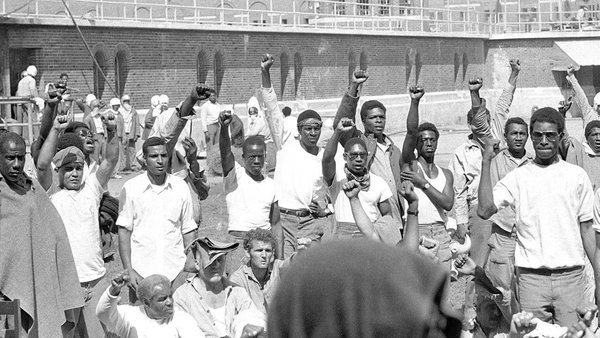Why "Black lives matter" matters
Properly used, groups can be a powerful vehicle for social, economic, and political change: They can facilitate "brainstorming," so several solutions to a problem can be proposed and analyzed; they can divide tasks so one individual is not overwhelmed with too many responsibilities

One of the principal themes running through the Monty Python troupe's classic comedy THE LIFE OF BRIAN involves the complexity of group dynamics. Set during the time of Christ, THE LIFE OF BRIAN explores the antics of several Jewish Resistance Groups-such as the People's Front of Judea, the Judean People's Front, the Popular Front, etc.-who spend so much time and effort fighting among themselves and with each other that they routinely ignore their common enemy-the occupying Roman Empire. In one especially effective scene, for example, two of these groups clash and destroy each other while Roman soldiers nonchalantly stand by and watch.
Groups can be a powerful vehicle
Properly used, groups can be a powerful vehicle for social, economic, and political change: They can facilitate "brainstorming," so several solutions to a problem can be proposed and analyzed; they can divide tasks so one individual is not overwhelmed with too many responsibilities; they can continue to thrive even when individual members leave or pass away; and they can combine their resources with like-minded groups to more effectively combat a problem or resolve an issue.
Unfortunately, working in groups can also generate problems, both internally and externally, that often undermines or destroys them: Philosophical disagreements among members often arise regarding a group's primary mission or tactics. This can lead to individuals within a group arbitrarily making statements or committing acts that are then wrongfully attributed to the group as a whole; Group members can have ulterior motives that are often not evident when they join. Organized crime figures, for example, have been known to surreptitiously infiltrate labor unions to either take over their leadership or, if that fails, to destroy them completely; and, finally, there is "The Drum Major Instinct." This phenomenon, discussed by Dr. Martin Luther King Jr. during his last sermon, occurs whenever group members are no longer content to march in the parade. They now want to lead it, and often form rival groups to do so.
When these problems arise, they often lead to factionalism and splintering. When they arise among competing groups, these problems can rapidly result in energy draining quests for financial resources, members, and media attention, which incessantly prevents the formation of coalitions. And all of these problems divert attention from a group's original mission and/or purpose.
And their enemies know it!
Recently, a documentary entitled THE BLACK PANTHERS: VANGUARD OF THE REVOLUTION ran on PBS stations throughout America. Timed to coincide with the fiftieth anniversary of the founding of the Black Panther Party (BPP), what made this documentary particularly compelling was how almost all the problems associated with group dynamics coalesced to ultimately destroy the BPP: Internal philosophical differences arose between one of the group's founders, Huey Newton, and the group's Minister of Information, Eldridge Cleaver, after Newton began to focus on "Survival Programs"-free breakfast for schoolchildren and medical clinics to serve the impoverished-which Cleaver believed undermined the struggle for political and economic revolution; The ulterior motives of informants and infiltrators resulted in the draconian sentence imposed on Lee Otis Johnson, leader of the Houston BPP (thirty years for possession of one marijuana cigarette), the wrongful imprisonment of Geronimo Pratt, leader of the Los Angeles BPP, and the murder of Fred Hampton, leader of the Illinois BPP; Finally, the Drum Major Instinct ultimately resulted in the "Newton Faction" and the "Cleaver Faction" vying for control of the BPP.
A Rainbow coalition
Externally, the BPP became embroiled in a feud with a "Black Nationalist" group called US, which led to the murders of several Panther members, and Hampton was thwarted in his efforts to forge an alliance with the Blackstone Rangers, or to create a "Rainbow Coalition" comprised of like-minded activists of different races.
What was unknown at the time was that most of the Panthers' efforts to build coalitions were being covertly undermined by the FBI's COINTELPRO operation. This was accomplished by the mailing of anonymous letters to both supporters and rivals of the BPP that falsely accused the Panthers of committing, or planning to commit, some indiscretion against them, and by placing agent provocateurs in BPP Chapters to incite violence, dissension, and paranoia.
In the Hampton case, for example, the FBI sent an anonymous letter to Jeff Fort, leader of the Blackstone Rangers, claiming Hampton was trying to take over Fort's "turf," and encouraging Fort to murder Hampton to prevent this. And anonymous letters were also sent to prospective members of Hampton's "Rainbow Coalition" containing racial epithets about them that were falsely attributed to the BPP.
Some critics have contended that, despite the FBI's efforts, the BPP was still primarily responsible for its own destruction, because it created the very factions the FBI was able to exploit. Others contend that this too easily ignores the insidious and covert machinations of COINTELPRO, and the fact that had these machinations become known, the BPP and its prospective allies and rivals might have responded differently.
There is some credence to this latter argument. COINTELPRO was not exposed until 1971, when a group of anti-war activists broke into an FBI office in Media, PA, and stole files outlining this operation. But, by then, the BPP, for all intents and purposes, had been largely destroyed.
Naturally, you may be asking what this has to do with BLACK LIVES MATTER (BLM). Well, one of the issues discussed in the numerous articles about VANGUARD OF THE REVOLUTION is that many, if not most, people under the age of thirty in the United States have never heard of the Black Panther Party; therefore, it was not surprising that the same tactics used by the Chicago Police and Cook County State Attorney Edward Hanrahan to cover-up or conceal the details about the police shooting of Fred Hampton were used almost half-a-century later by the Chicago Police and Cook County State Attorney Anita Alvarez to cover-up or conceal the details about the police shooting of Laquan McDonald.
Also, if people under thirty have never heard of the BPP, then they've probably never heard of COINTELPRO. And this means that the same tactics used to destroy the BPP could be used to destroy other activist groups today.
Already we are seeing some COINTELPRO style rhetoric being directed against BLM, from Fox (Faux) News's Bill O'Reilly comparing it to the Ku Klux Klan, to proposed police boycotts of Beyonce's concerts because of her Super Bowl performance that acknowledged both the BPP and BLM, to the vile and putrid rants of former New York City mayor Rudy Giuliani, a human being so repulsive that he once attempted to gain the presidency by pimping the tragic events of 9/11 for his own aggrandizement.
Awareness of COINTELPRO, and its tactics, is essential to BLM's survival, and to the survival of any political group challenging the status-quo in America. Looking askance at that anonymous letter from a so-called "friend," exercising caution to avoid displaying dissension within a group to the public, and/or resisting the urge to engage in some questionable activity being espoused by people who recently "joined" your group will go a long way towards minimizing the problems that groups typically face, and raise awareness of who might be instigating them.
The corruption of America's legal system impacts all Americans, regardless of their race. In communities without significant populations of racial minorities, poor whites are usually the ones victimized by police misconduct and brutality, by corrupt prosecutors who withhold evidence and suborn perjury to pad their conviction rates, and by corrupt state judges seeking to enhance their reelection chances.
It is important, indeed essential, to remember that any reforms to the legal system achieved by the efforts of BLM, and similar activist groups, will apply to all Americans, regardless of their race. This is why Black Lives Matter matters-to everyone.
David R. Hoffman, Legal Editor of Pravda.Ru
Subscribe to Pravda.Ru Telegram channel, Facebook, RSS!




